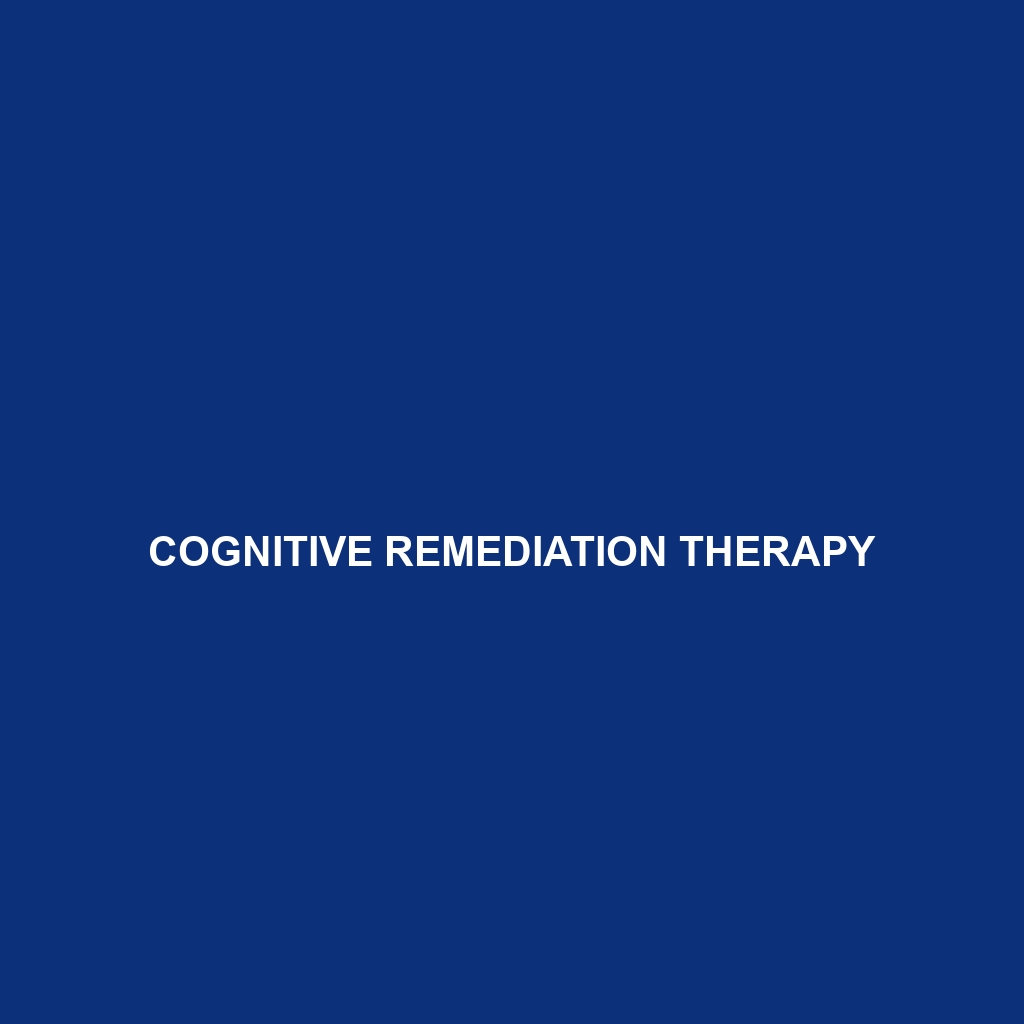Cognitive Remediation Therapy: Enhancing Mental Health Through Targeted Strategies
Overview
Cognitive Remediation Therapy (CRT) is a structured therapeutic approach designed to improve cognitive function by addressing deficits often seen in various mental health conditions. The primary focus of CRT is to enhance cognitive abilities such as attention, memory, and problem-solving skills, enabling individuals to navigate daily challenges more effectively. Developed initially for individuals with schizophrenia, the application of CRT has expanded to various populations, including those suffering from depression, anxiety, and brain injuries. With a solid foundation in cognitive psychology, CRT aims to provide practical, evidence-based strategies that equip participants with tools to better manage their mental health and improve overall quality of life.
How It Works
The methodology behind Cognitive Remediation Therapy incorporates several key practices and theoretical frameworks. Here’s how it functions:
- Assessment: The initial phase of CRT involves comprehensive cognitive assessments tailored to identify specific cognitive deficits experienced by the participant. This may include standardized tests and interviews aimed at understanding the individual’s unique cognitive profile.
- Personalized Training Programs: Based on assessment results, a customized training program is developed. These programs typically include computer-based exercises, game-like tasks, and hands-on activities that challenge various cognitive functions.
- Structured Sessions: CRT is usually delivered in structured sessions, often conducted two to three times per week. These sessions not only provide the cognitive exercises but also include discussions aimed at relating cognitive gains to real-life situations.
- Progress Tracking: Throughout the therapy, progress is meticulously tracked through re-assessment and feedback, allowing for adjustments in the program to align with the individual’s evolving needs.
- Integration with Other Treatments: CRT is often complemented by other therapeutic approaches, such as individual psychotherapy or medication management, providing a holistic treatment strategy.
Benefits
Cognitive Remediation Therapy offers numerous advantages for participants, including:
- Improved memory retention and recall.
- Enhanced attention span and concentration abilities.
- Greater problem-solving skills and improved decision-making processes.
- Increased motivation and engagement in daily tasks.
- Better emotional regulation and management of stress.
- Empowerment through skill development, fostering independence.
- Enhanced readiness for vocational or academic pursuits.
Who It’s For
Cognitive Remediation Therapy is particularly beneficial for a diverse range of individuals, including:
- Individuals with Schizophrenia: Many people experiencing schizophrenia show cognitive deficits that CRT aims to address, improving their overall functioning and quality of life.
- People with Traumatic Brain Injuries: Those who have suffered brain injuries may experience cognitive challenges that CRT can help remediate, enabling better adaptation to life changes.
- Individuals with Mood Disorders: CRT is effective for those with depression or anxiety, helping them overcome cognitive hurdles that contribute to their conditions.
- Students Struggling Academically: Young people facing cognitive challenges in educational settings can benefit from CRT by improving their learning capacities and academic performance.
- Older Adults: As cognitive decline can occur with age, CRT offers strategies aimed at maintaining and enhancing cognitive functions in seniors.
Special Features
Cognitive Remediation Therapy encompasses several unique aspects that distinguish it from other mental health interventions:
- Evidence-Based Approach: CRT is grounded in extensive research, with numerous studies demonstrating its efficacy in improving cognitive functions across various demographics.
- Customizable Programs: Unlike one-size-fits-all programs, CRT is tailored to meet the specific cognitive needs of each participant, ensuring focused and effective treatment.
- Use of Technology: Many CRT programs incorporate technology through the use of computer-based tasks which can enhance user engagement and motivation.
- Holistic Integration: CRT is designed to be integrated with other therapeutic methods, creating a comprehensive treatment plan that addresses both cognitive and emotional health.
- Real-Life Application: The therapy emphasizes the practical application of cognitive strategies, helping participants transfer skills gained in therapeutic settings to everyday situations.
Why Choose This Service
In a world where mental health is increasingly recognized as a pivotal component of overall well-being, Cognitive Remediation Therapy stands out as a valuable tool for individuals seeking to enhance their cognitive functioning. The therapy not only addresses cognitive deficits but also empowers participants by equipping them with essential life skills that can lead to greater independence and improved quality of life. With its evidence-based methodology, personalized training approaches, and integration with other forms of therapy, CRT represents a forward-thinking solution tailored to meet the complex needs of diverse populations.
By choosing Cognitive Remediation Therapy, individuals can take a proactive step towards reclaiming their cognitive abilities and enhancing their mental health journey. Consider exploring this innovative service today and discover how it can facilitate a brighter, more empowered future.
